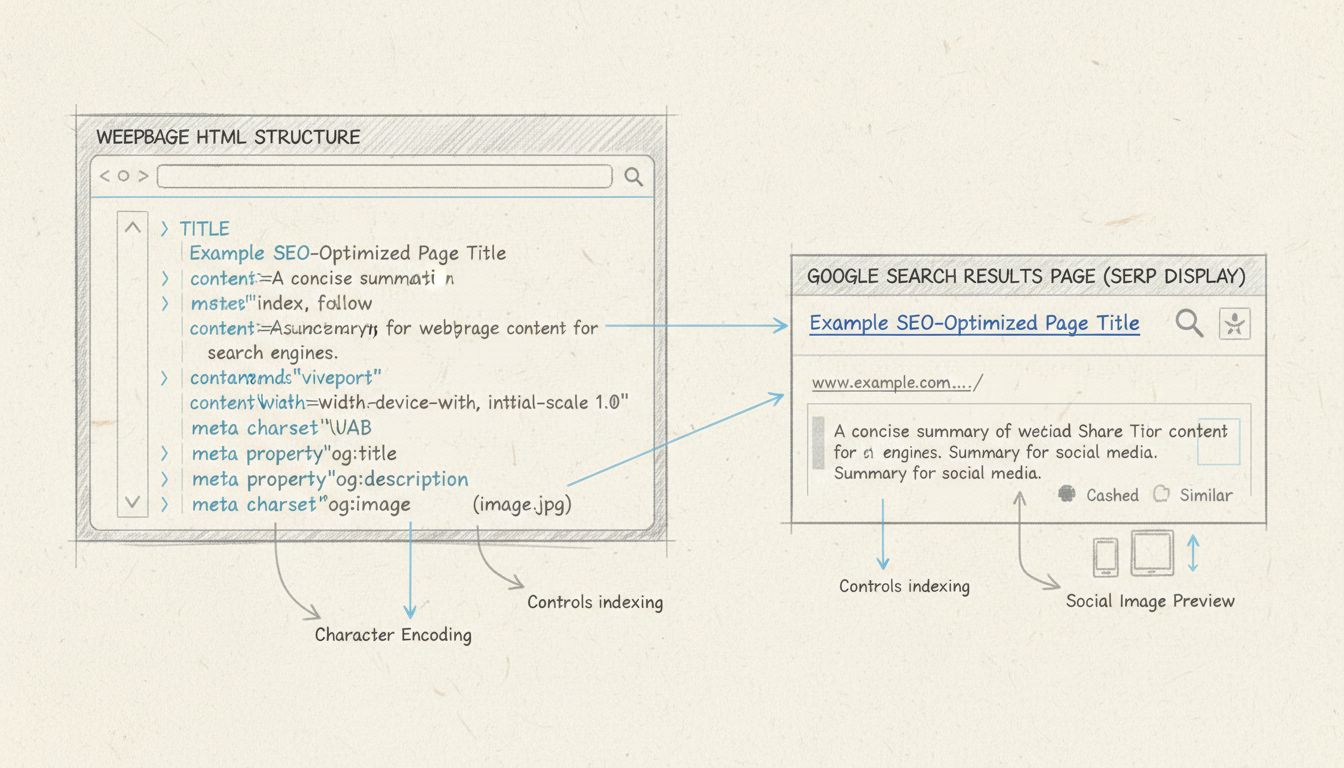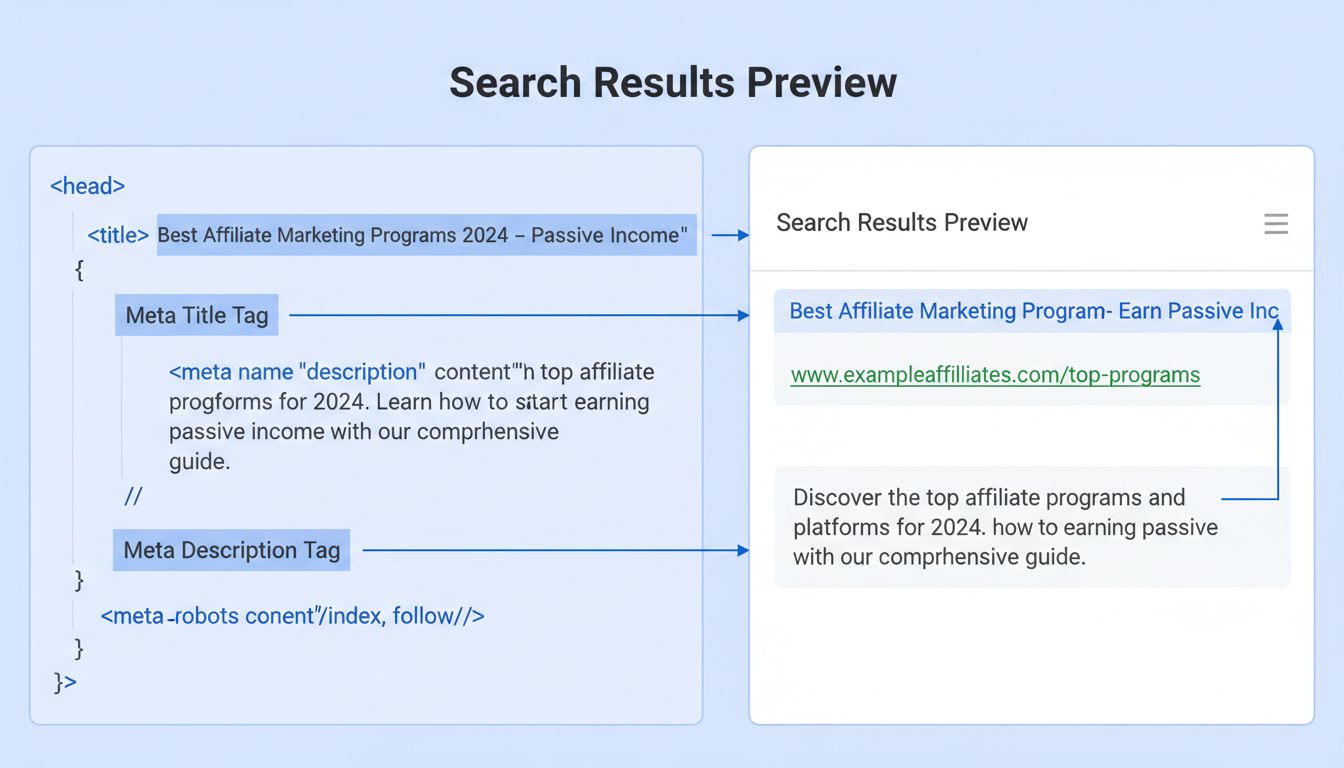
How Can I Use Meta Tags for SEO?
Learn how to use meta tags for SEO effectively. Discover essential meta tags like title, description, robots, and Open Graph tags to boost your search rankings ...
Learn what meta tags are, their importance in SEO and affiliate marketing, and how to optimize them for improved visibility and traffic.
Meta tags are crucial elements in HTML that provide metadata about a web page. These invisible snippets of text offer search engines and other web services essential information about a webpage’s content, author, and other attributes. Although they aren’t visible on the webpage itself, meta tags significantly influence how your content is indexed and displayed in search results, affecting both visibility and ranking. This glossary entry offers a comprehensive understanding of meta tags, their various types, and their role in search engine optimization (SEO), particularly in the context of affiliate marketing and affiliate software.
Meta tags are instrumental in SEO, affecting how your site is interpreted by search engines and users. Although not all meta tags impact rankings directly, they play a crucial role in visibility and click-through rates:
Meta tags like the viewport tag ensure your web pages are accessible and user-friendly across all devices. This adaptability is vital for affiliate marketers seeking to reach a broad audience, including mobile users.
For affiliate marketers, meta tags can enhance the effectiveness of their content. By optimizing meta tags, marketers can:
width=device-width to adapt to various screen sizes.initial-scale=1.0 for consistent initial load.In affiliate marketing , meta tags are indispensable for driving organic traffic and maximizing conversions. By providing search engines with precise information about your content, meta tags help ensure your affiliate links reach the right audience. Furthermore, optimizing meta tags can enhance the visibility of your content on social media, where many affiliate marketers find a substantial portion of their audience.
While meta tags are powerful, it’s essential to focus on those that are relevant today. The meta keywords tag, for instance, is obsolete and no longer influences SEO. Instead, focus on tags that affect visibility and user engagement, like meta descriptions and title tags.

One question often arises: How much time should you dedicate to meta tags? Neil Patel, a renowned digital marketing expert, shares his insights on this topic, providing valuable guidance that affiliate marketers can leverage to enhance their strategies effectively.
When you perform a Google search, the first thing you notice on the listings page is the title and description. These are your title tags and meta descriptions, critical components of meta tags. However, in the realm of affiliate marketing , it’s crucial to understand which meta tags are worth your time.
These elements serve as the face of your webpage in search results. Patel advises spending just a few minutes crafting these tags for a new page. The goal is to make them appealing to encourage clicks. Keep the title tags concise, around six to seven words, and the meta descriptions succinct, between 120 to 140 characters. This practice ensures you maintain the reader’s attention while conveying essential information.
The meta keywords tag, once a staple in SEO strategies, is no longer relevant. Google has disregarded it for years, and investing time here won’t benefit your search rankings. Instead, focus your efforts on creating engaging and relevant title tags and meta descriptions.
For affiliate marketers, the initial launch of a webpage is just the beginning. After six to seven months, reevaluate your page’s performance using tools like Google Search Console. Identify which pages are attracting traffic and consider refining their meta tags. By incorporating high-performing keywords and phrases into your title tags and meta descriptions, you can enhance your search rankings and drive more traffic.
As you become more seasoned in affiliate marketing, you’ll find that optimizing meta tags becomes second nature. Patel suggests that with practice, creating or updating meta tags can take mere seconds. This efficiency allows you to focus more on strategic aspects of your affiliate marketing campaigns , maximizing your impact with minimal effort.
Why are meta tags important for affiliate marketing?
Meta tags are crucial for improving visibility in search engine results, which can drive more traffic to your affiliate links and increase conversions.
How often should I update my meta tags?
Initially, spend minimal time on meta tags. Revisit and optimize them after six months based on performance data from tools like Google Search Console.
Are meta keywords still relevant?
No, meta keywords are outdated and not used by Google for ranking purposes. Focus on title tags and meta descriptions instead.
In affiliate marketing, time is a valuable resource. By understanding the importance of meta tags and optimizing them efficiently, you can significantly enhance your online presence. Start by spending minimal time on new pages and revisit them after six months to refine your strategy. As Neil Patel emphasizes, with practice, you’ll master this process quickly, allowing you to dedicate more time to growing your affiliate marketing endeavors.
Ready to transform your affiliate marketing strategy ? Dive into the world of optimized meta tags and watch your traffic soar!
Some tips on writing effective meta tags include using keyword-rich titles and descriptions, and avoiding meta tags that are too long.
There are many ways to use meta tags for SEO such as using meta tags that are relevant to your content, including keywords and key phrases, and updating your meta tags regularly.
To add meta tags in WordPress, you need to install and activate the Yoast SEO plugin. After activating the plugin, click on the SEO menu item in the left-hand sidebar and then click on the Titles & Metas tab. From here, you can add meta tags to your WordPress site.
Some tips on writing effective meta tags include using keyword-rich titles and descriptions, and avoiding meta tags that are too long.
There are many ways to use meta tags for SEO such as using meta tags that are relevant to your content, including keywords and key phrases, and updating your meta tags regularly.
To add meta tags in WordPress, you need to install and activate the Yoast SEO plugin. After activating the plugin, click on the SEO menu item in the left-hand sidebar and then click on the Titles & Metas tab. From here, you can add meta tags to your WordPress site.
Meta tags are crucial for improving visibility in search engine results, which can drive more traffic to your affiliate links and increase conversions.
Initially, spend minimal time on meta tags. Revisit and optimize them after six months based on performance data from tools like Google Search Console.
No, meta keywords are outdated and not used by Google for ranking purposes. Focus on title tags and meta descriptions instead.
Master the essentials of meta tags to boost your website's visibility and drive targeted traffic in affiliate marketing.

Learn how to use meta tags for SEO effectively. Discover essential meta tags like title, description, robots, and Open Graph tags to boost your search rankings ...

Discover why meta tags are crucial for affiliate marketing success. Learn how title tags, meta descriptions, and robots tags improve SEO rankings, boost click-t...
A meta description is a brief and straightforward text that describes the content of a web page. Learn how it can affect your SEO.
Cookie Consent
We use cookies to enhance your browsing experience and analyze our traffic. See our privacy policy.